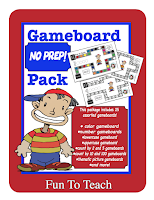Gameboards
Easy!
Fun! Flexible!
Don’t
forget to teach the basics!
Many students come to school without knowing
how to play boardgames. Students are enamored
with the many game pieces, bright colors, special spaces, and fun of
boardgames! To Guarantee a learning environment in your classroom and to get
the most out of game playing teach the behavior and expectations you
require. Before you offer the exciting
practice of boardgames to your students remember to teach routines and
procedures for the basics. Here are some
suggestions:
Introduce
the game board. Explain what students see on the board. This includes any
graphics or writing on the board. Identify the start and end spaces on the game
board. Show where the gamepeices line up and where to put the gamepiece on each
space.
Introduce
the game pieces. These include items such as a spinner, a die (or dice), and
game pieces. You may have to explain the function of what each game piece is by
describing its function. A fun classroom rule when passing out game pieces is
to chant, “You get what you get and you don’t throw a fit!” J
Practice moving the game pieces around
the game board in the correct direction.
Practice rolling the dice. In my
class we have a rule that if the dice goes off the table, the player loses
his/her turn. Explain to students that game play goes in a
clockwise direction.
 Encourage
students to talk about what it means to play fair. By sharing specific examples such as taking
turns and waiting patiently while another player makes his or her move will set
the tone in your classroom. Use
students’ responses to form the basic ground rules around playing
gameboards. Talk to your students about
winning and losing. Give them the
phrases to use at the end of the game…”congratulations on your win, but watch out
next time, I am on your heels” or “It doesn’t matter if you win or lose as long
as you have fun!”
Encourage
students to talk about what it means to play fair. By sharing specific examples such as taking
turns and waiting patiently while another player makes his or her move will set
the tone in your classroom. Use
students’ responses to form the basic ground rules around playing
gameboards. Talk to your students about
winning and losing. Give them the
phrases to use at the end of the game…”congratulations on your win, but watch out
next time, I am on your heels” or “It doesn’t matter if you win or lose as long
as you have fun!”
Present
the vocabulary of gameboards. Make a
word wall and include words like die, dice, spaces, spinners, board, clockwise,
etc.
Read
the game directions. Have the child repeat the directions back to you to make
sure he/she understands how to play. Remind students that game play is a
privilege.
Lori


No comments:
Post a Comment